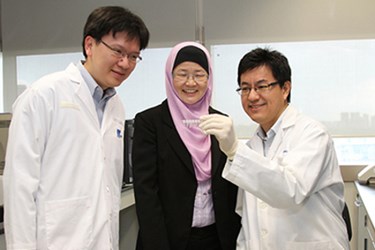Using Gold Nanoprobes To Determine Genetic Response To Drug Treatment
By Joel Lindsey

A team of researchers at the Institute of Bioengineering and Nanotechnology (IBN) in Singapore has found a way to use gold nanoprobes to determine genetic information that could help doctors administer safer and more effective drug treatment therapies.
In particular, the new genetic test could benefit those seeking treatment for stroke, heart problems, and deep vein thrombosis.
“Diseases caused by blood clots can be potentially fatal. Genetic testing can improve the treatment of such medical conditions,” Jackie Y. Ying, executive director of IBN, said in a press release published recently by the institute. “By combining our expertise in molecular diagnostics and nanotechnology, we have developed a new genetic test that can determine the appropriate drug dosage to be administered for each patient.”
Recognizing that individual dosages of warfarin — the most commonly used anticoagulant drug — are highly variable and that incorrect dosages can lead to adverse reactions in some patients, the team of researchers focused on using genetic information to help determine just how much warfarin would be most beneficial for an individual patient.
In order to do this, DNA was extracted from a patient’s blood or saliva and amplified. It was then added to a specially formulated pink-colored solution of gold nanoparticles, which reacted with the DNA in different ways depending on the sample’s genetic variation. If any of the three most common genetic variations associated with warfarin response were present in the DNA sample, the gold nanoprobe liquid remained pink, but if none of the variations were present the liquid lost its color.
According to the press release, the entire process takes 10 minutes to complete and can be performed with standard laboratory equipment, making it a highly affordable and easy test to administer.
“This nanoprobe technology is highly flexible and can be extended to detect other genetic variations,” said Ying. “By making molecular diagnostics information more readily available, doctors will be able to provide personalized treatment that is safer and more effective.”
Details regarding the study and outcomes of initial tests involving the new technique were published in the journal Nano Today.
The new technology is currently being tested at KK Women’s and Children’s Hospital in Singapore.
Image credit: Institute of Bioengineering and Nanotechnology (IBN)
